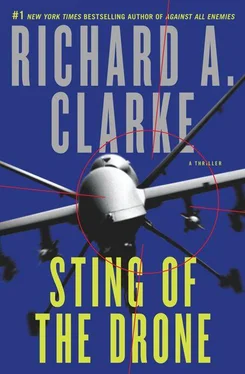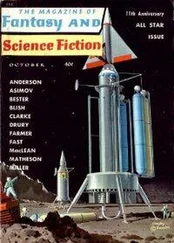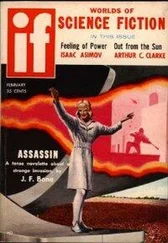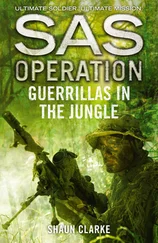He hit “Home” on the Camaro’s communications screen and he heard her voice after two rings.
“Hey, hon. You on your way home already?” Jennifer Parsons was a night owl who preferred to see her patients after dark and then stayed up writing her reports until Erik came home near dawn. In nocturnal Vegas, it didn’t seem that odd.
“Five minutes out. It’s been a good night.” Erik accelerated the car at the thought of seeing his wife. “Meet you in the pool?” He pushed the speedometer past ninety as he headed down route 95 toward their North Las Vegas housing development.
“I’m beginning to see some advantages to this whole Empty Nest syndrome,” she replied. “I’ll bring the brewskies, Flyboy.” With that, Dr. Jennifer Parsons rose from her desk, unbuttoned Erik’s old shirt, let it drop to the floor of her home office, and then walked naked down the hall to the kitchen. She slid back the glass door to the patio and, beers in hand, stepped from the barbecue area down to the pool and the hot tub. She did three laps before she heard his car and finished the fourth while watching him climb out of his flight suit and dive toward her.
Fifteen minutes later they got around to the Heinekens in the hot tub. Erik looked again at the stars. “He was a big one, Jen. Well hidden. Bruce found him. Another guy would have missed it.”
“Good, Bruce needed a lift.”
“We’re finding them, Jen. We’re winning.” Erik threw his two arms up in the air, mimicking a monster, moving across the hot tub toward his wife. “We’re gonna get them all, ha, ha, ha.”
Jennifer Parsons ran her fingers through the thinning black hair on his head and then through the graying hair on his still firm pecs. He kissed her breast, then moved his head lower. She threw her head back. She thought the sky in the east seemed pink; maybe daybreak was approaching. Or maybe it was the glow from the Strip, maybe just a false dawn. She had lost all track of time.
TUESDAY, JUNE 30
THE SITUATION ROOM
THE WEST WING, THE WHITE HOUSE
WASHINGTON, DC
Winston Burrell was late. His chair, at the head of the table that filled the room, was empty. The Seal of the President of the United States hung on the wall behind his chair, giving the room an aura. This was not a corporate boardroom, not a Congressional committee room. It was a place where power was the currency. Meetings in this space had saved lives and taken lives. Today’s meeting was about taking lives.
The old chair had been replaced with one that better fit Burrell’s height and weight. He was not of average build. He was not average in many ways. For a man who had started his professional life as an international relations academic, he had become the quintessential behind-the-scenes operator, making things happen first in state government, then in the corporate world, and then in national politics as the White House National Security Advisor. While he could recite the details of almost any national security issue, it was in understanding their domestic political relevance that he excelled. The President was focused on domestic policy challenges. Burrell was intent on not letting national security get in the way or take up too much of the leader’s time. He saw his job as preventing disasters, promoting those causes that bought the President domestic support.
The men and women who waited were far from displeased to have some time together without the National Security Advisor. This was when the number twos and number threes from the departments and agencies got to meet, gossip, ask each other for favors, trade and deal, complain and bargain, with only one aide each looking on. This time, before the meeting started, was where the wheels were greased and coordination accomplished, without rhetoric or pretense.
“Sorry to be late,” Burrell said as he entered the room and plopped down in the big chair. He wasn’t sorry, of course, and everyone knew it. “Sorry, too, that we haven’t been able to have this meeting sooner,” he said. Most of those around the table doubted that, too. They knew he found these sessions distasteful. He disliked having to decide who lived and who died.
Winston Burrell looked around the table. The two highest ranking representatives were the Under Secretaries from State and Defense, both women. Nancy Schneidman from Defense might be the first female Secretary of Defense in a few years. Her opposite number from State, Liz Watson, was a career Foreign Service officer. She had been ambassador to Turkey.
Admiral Harlan Johnston was a SEAL assigned to the Joint Staff at the Pentagon. Like many of the “Special Operations community,” he did not look the part. Slightly shorter than average, he probably weighed less than anyone in the room. As he opened his briefing book, he donned a pair of black glasses that would have made his social life difficult had he still been in high school. He had served in combat in Somalia, Kosovo, Iraq, Afghanistan, and places where the Pentagon never acknowledged the presence of U.S. military personnel. Then they had made him an admiral and assigned him to Special Operations Command headquarters in Tampa, where the endless PowerPoint slides and bullet papers had caused him to see the optometrist.
Ron Darden from Justice was probably the wealthiest person at the table. He had been managing partner of a Los Angeles law firm before joining the Administration as Associate Attorney General. He was also the only person of color at the table.
The Intelligence Community was two headed. Seth Kaplan was the number two at CIA, but he was accompanied by Todd Hill, who ran the National Counter Terrorism Center. Hill frequently, awkwardly, made the point that the NCTC did not report to CIA. Both men sat at the table.
“I know the requests have been piling up. So let’s get started. You all have the files. Let’s start with the Pentagon nominations. Admiral?”
“We have six nominations,” Admiral Johnston began. “Two in Afghanistan, one each in Yemen, the Philippines, Algeria, and Chad. All are AUMF cleared by the Pentagon.”
The Under Secretary of Defense, Nancy Schneidman, representing the civilian control of the military, concurred. “Right, Winston, we believe all of these six men pose an ongoing, continuous, or imminent threat to U.S. military personnel and/or are senior officials of AQ or an al Qaeda affiliated group. As such, they are all eligible under the criteria for Authorized Use of Military Force.” She had said the magic words, chanted the incantation that would place a hex on and doom men probably then asleep, thousands of miles away.
Two rows of three squares appeared on the large screen at the other end of the table from Burrell. Each square had a photograph of the intended victim, a code name, his real name, and some words in a font too small to read.
“Everyone has had these noms for a while now,” Burrell observed. “Any questions or objections?”
“I have a question about the guy in the Philippines,” Liz Watson, the Under Secretary of State, began. “Explain to me how a guy in the jungles of Mindanao is a threat to U.S. forces. And is the civilian government aware of this? I mean, at what level have the civilians signed off on this in Manila? Their President know?”
Burrell nodded to the Admiral to answer.
“You would be speaking about Rambler,” he said, pulling a green file folder out from a stack he had placed on the table. Each folder was covered with a red and black striped paper with the words TOP SECRET in a large font size at the top and bottom.
“Rambler?” Burrell asked.
“We’re using old car names now as code words,” Under Secretary Schneidman explained. “Someone objected to our using Native American tribe names.”
Читать дальше












